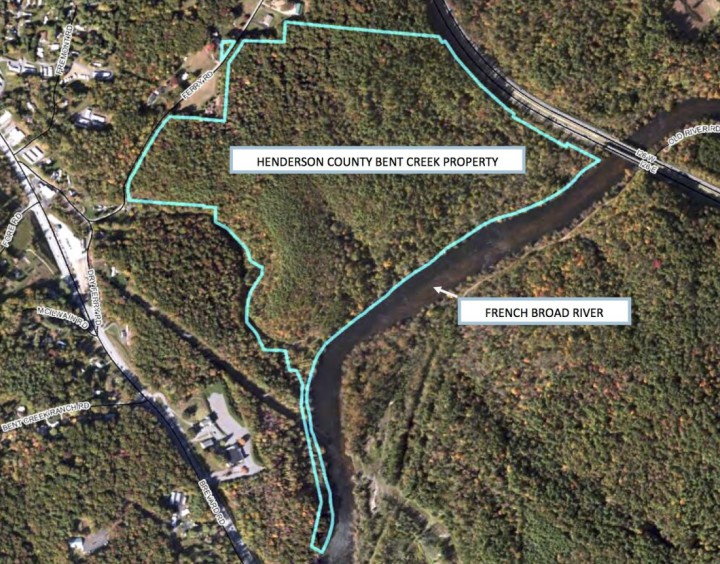On April 7, the Buncombe County Board of Commissioners split down party lines to approve a $6.8 million land purchase they say is needed for an economic development project with an unnamed business, “Company A.”
The purchase, a 137-acre tract along Ferry Road in Bent Creek, is owned by Henderson County, which has already approved Buncombe’s offer. Under the terms of the Interlocal Agreement between Henderson County and the city of Asheville, the net cost for Buncombe amounts to $3.4 million and the sale must be approved by both the city of Asheville and Henderson County.
Commissioners met last month in closed session to discuss the investment with Company A, which has expressed to the board that it wishes to remain anonymous. “Buncombe County has been working with a potential economic development partner, which is considering expanding its operations into [this county],” reads a passage in the purchase resolution. “This project requires a large tract with nearby highway access.”
County Manager Wanda Greene explained to the board: The company’s possible Western North Carolina expansion will bring “significant return investment” in jobs and economic prosperity to the county — but its decision to move to the region isn’t final yet. The company is looking at other locations around the country, with Ferry Road/Bent Creek being the only North Carolina location it’s considering. If commissioners were to vote against the purchase of land, the company will cross WNC off its list and move on to another location, said Greene.
The county has a back-up offer for the land if Company A falls through, Greene said, but it’s not as high-use or high-interest.
“We’re looking at excellent jobs for our people,” said Commissioner Holly Jones. “We should go full steam ahead and try to land those jobs.”
The purchase proposal was then opened up to public comment.

Bent Creek resident Mike Bowman stepped up to the podium. “I’m a property owner on Ferry Road, and this land is right in my backyard,” he began. “But I wonder — industrial development. What will be in my backyard? I’d hate to see that natural environment ruined, but I understand it’s necessary for growth, industry, jobs, community.”
“The fact that this started behind closed doors is just wrong,” said concerned resident Betty Jackson. “And you needed to have a bigger public comment period.”
After the residents had said their peace, commissioners resumed the discussion.
“It’s a project where the outcome is uncertain,” said Commissioner Brownie Newman, after Greene noted that the company has not officially picked the Buncombe location. “But we should go into this with eyes wide open. We’ve got a great team working on it, and we have the potential for the largest economic development project in decades.
“This would be another great partner in our community for years and years — living-wage jobs to support middle class families for decades to come,” he continued. “And it’s a clean project, too — clean energy. Worst-case scenario is that we have a $6.8 million property — a beautiful piece of property.”
Board chair David Gantt continued Newman’s thought, saying that the purchase, even if Company A doesn’t select it, will still offer endless possibilities for potential future use. But, he says, “If we don’t purchase this land, we have zero possibility for this economic project. That’s it. We’re out.
“We’re a player here. We have a chance. There’s no guarantee, but in the end, we are responsible” for our own economic situation, Gantt said.
Commissioner Mike Fryar voiced concern about the way the board had handled the discussion at the March 17 closed session, stating the decision had already been made “in the back room.” He said that some commissioners were nodding along in agreement with the purchase of the property during that session; he argued that the vote had already been made.
Voting is not a legal action during a closed session, which commissioners can hold for matters like litigation, personnel issues or economic-development negotiations. County Attorney Bob Deutsch maintained that the actions Fryar referred to do not actually count as voting.
After fervent discussion, commissioners voted 4 to 3 to approve the purchase, with Fryar, Belcher and DeBruhl opposed.
Closed but recorded?
Following a lengthy discussion on a state legislature decision that commissioners will vote on at the next regular meeting, closed sessions came up again during the analysis of a proposed policy for recording them. The recordings would be made public record after an appropriate amount of time, determined on a case-by-case basis.
“I think it’s a great idea,” said Commissioner Miranda DeBruhl after reading aloud the proposed policy. “For a long time now, I’ve heard folks on both sides of the aisle talk about transparency and secret sessions. You’re either for secret sessions or against secret sessions — for transparency or against transparency. We can be trailblazers for open government in Buncombe County.”
Commissioner Joe Belcher also expressed his support for recording the sessions. “It doesn’t change the content and will not affect economic development,” he said. “I support it.”
Fryar came back to his comment on the Ferry Road/Bent Creek vote. “Earlier, you said we didn’t have a vote on economic development in private,” he said, addressing Gantt. “But when you went to WLOS, [you explained] the county would be purchasing this land. That is [implying] you know the votes. It’s a done deal before it’s voted on.”
Commissioners Newman, Ellen Frost and Jones strongly opposed the recording of closed sessions.
“Transparency is great, and there are ways we can improve [the transparency of closed sessions],” Newman explained. “But this is not one of them. We can only go into closed session for a number of [sensitive] reasons. And there are requirements for disclosing” the content of those meetings.
“Our staff does a great job complying with [those requirements]. If we tell businesspeople that the sessions will be recorded, that is one of the worst decisions the county could make, from an economic-development standpoint,” said Newman. Releasing “detailed information … to the public” during negotiations isn’t “appropriate” in many circumstances, he said. “There’s a reason we go into closed session.”
DeBruhl retorted, “We all know that seven people can watch a car accident and have seven different interpretations of what happened. [Recording the sessions] would eliminate any gray area.”
Gantt then called Ben Teague, director of the Asheville Economic Development Coalition, to speak about negotiating economic-development projects.
Teague noted that it’s very important to maintain trust during the process, stating that not all businesses care to have their private discussions aired as public record during the course of a potential development.
The key phrase there, DeBruhl said, is “‘during the process.’ We’re talking about [publishing the recording] afterward.”
Newman then said, “But we already release the minutes.”
And DeBruhl retorted, “In a summary.”
“It’s very inappropriate,” Newman repeated, to release all the intimate details of a business to the public. It makes the business hesitant to disclose private information and withhold possible crucial details — all while making the company feel uneasy working with the county, he said. This could potentially drive business away.
Fryar expressed that he understood Newman’s point, but that in the end, “it’s not going to matter whether it’s written down or on recording.” The details are still there.
Shortly before the vote, Gantt commented that the recording resolution “is a solution searching for a problem. On one side, you’ve got smoke-filled rooms where [the public] doesn’t know anything. On the other side, you disclose everything and run into [legal] and economic problems. People will be discouraged from doing business here.”
DeBruhl noted that state legislature records its closed sessions. So if it works for them, why would it not work for the county?
The motion to adopt a policy to record closed sessions then failed to pass the board in a 3 to 4 vote, Frost, Newman, Gantt and Jones against.
The next regular Buncombe County Board of Commissioners meeting will be held on Tuesday, May 5, at 4:30 p.m.




March 17 closed meeting minutes: An hour and a half meeting, 7 short sentences contained in the meeting minutes.
http://www.buncombecounty.org/common/commissioners/minutes/2015-03-17.pdf
Hey Tim,
Not to be nitpicky, but the March 17 closed session lasted 45 minutes, not an hour and a half. They held the closed session right before the retreat I reported on, so I was outside waiting the whole time. Your point still stands, but I just thought I would point out the time for total accuracy.
OK, good. Thanks for the correction. I thought I heard Commissioner Fryar say it was longer.
Buncombe County Commissioners Meeting, 4/7, Recording Closed Sessions (55:15) http://www.youtube.com/watch?v=n_NiZRYY4OQ&t=55m15s
Economic incentive policy picks winners and losers and is unfair politics and bad business, an equivalent tax cut would always attract more jobs than any specific economic incentives, without likely corruption or unfair practices.